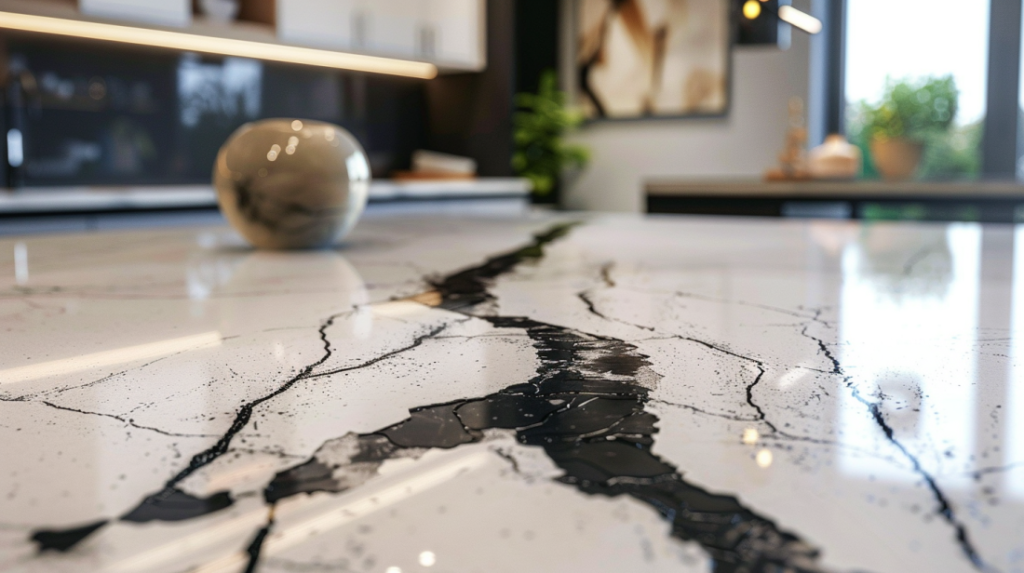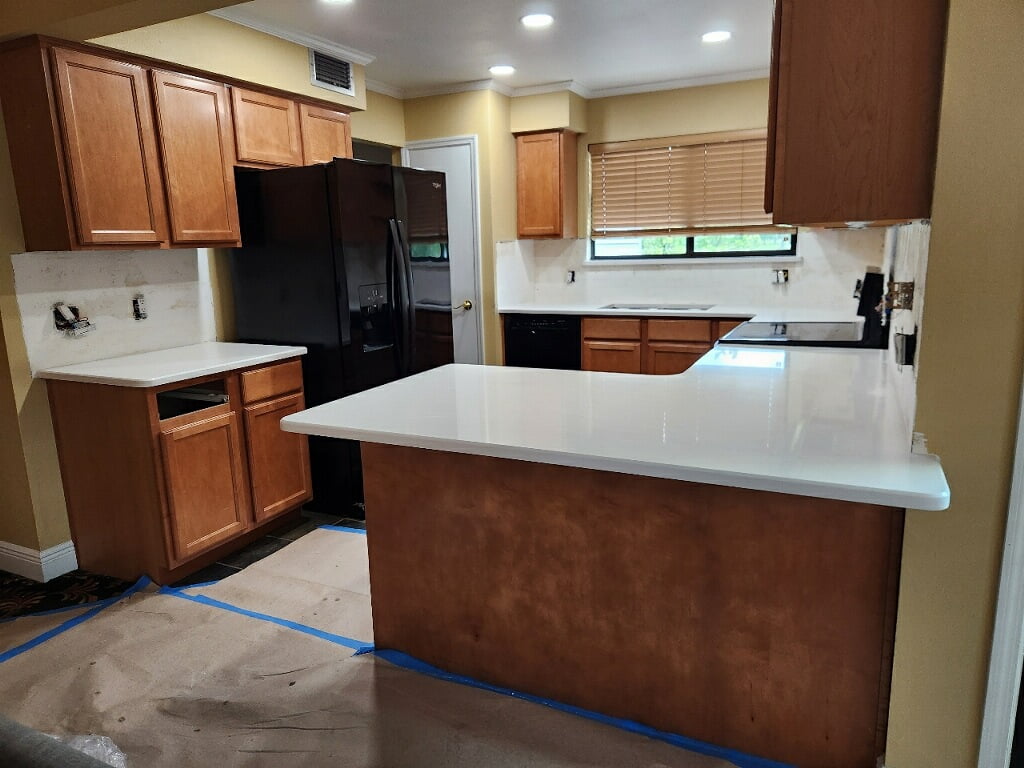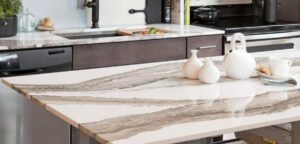Even though quartz is one of the most durable materials for countertops, it can still crack and sustain damage. Given the high cost of quartz, it’s crucial to minimize factors that might harm your elegant new countertops.
So, what causes quartz countertops to crack? Despite being tougher than many other materials, quartz countertops can be damaged by poor installation, extreme temperatures, heavy objects, and sharp edges.
In this article, we will delve into these potential hazards in detail, providing you with a thorough understanding of what could unintentionally damage your quartz countertops. Armed with this knowledge, you can take steps to prevent chips and cracks, ensuring your beautiful countertops remain in excellent condition for many years to come.
Factors That May Cause Quartz Countertops to Crack
Poor Installation
If your quartz countertops are not cut and measured correctly, weight and pressure may be unevenly distributed across the surface, increasing the likelihood of cracks. To ensure proper support and longevity, always hire a professional to cut, measure, and install your quartz countertops. Though this may seem costly upfront, it will save you money and hassle in the long run.
Low-Quality Quartz
Opting for cheaper, lower-quality quartz can result in weaker countertops compared to those made from higher-quality materials. To determine if your quartz is high-quality, check its composition. Lower-quality quartz often contains a mix of quartz and other materials like concrete or glass. Conduct thorough research on the brand before making a purchase, and remember: if a deal seems too good to be true, it probably is.
Extreme Temperatures
Exposure to extreme heat and cold is a common cause of quartz cracking. Avoid placing anything below freezing or above boiling points directly on your countertops. Never put a bag of ice directly on the surface, and always use a hot pad before placing a pot or pan from the stove onto the countertops. Prolonged exposure to direct sunlight can also cause cracking over time, so consider using curtains in your kitchen to protect your countertops.
Heavy Objects
Heavy appliances, as well as sitting or standing on your countertops, can cause them to crack. Avoid placing heavy items on your countertops and refrain from using them as seating or standing surfaces.
Sharp Edges
Tossing items with sharp edges, such as knives, keys, or tools, onto your countertops can lead to scratching, chipping, or even cracking, especially if the installation was not professionally done. To prevent damage, avoid exposing your quartz countertops to sudden impacts altogether.

How Can I Prevent My Quartz Countertops from Cracking?
To prevent your quartz countertops from cracking, avoid the following:
- Tossing Sharp or Heavy Objects
Avoid throwing sharp or heavy objects onto the countertop’s surface to prevent damage. - Using Poor Quality Materials or Unprofessional Installation
Invest in high-quality quartz and professional installation to ensure durability and longevity. - Allowing Prolonged Contact with Heavy Vibrating Appliances
Keep heavy, vibrating appliances like dishwashers from prolonged contact with your countertops. - Placing Hot Pots or Pans Directly on the Counter
Always use a hot pad when moving pots or pans off the stove to the counter to avoid thermal shock. - Placing Frozen Items Directly on the Counter
Use a towel as a buffer when placing frozen items or bags of ice on the counter to prevent cracks from extreme cold. - Sitting or Standing on the Counter
Never sit or stand on your countertops, even briefly, to avoid unnecessary stress and potential cracking.
How Can I Fix a Cracked Quartz Countertop?
For small cracks, about the size of a quarter, DIY home remedies can be effective. For larger cracks, it’s best to hire a professional to avoid further damage. If your countertop cracks soon after installation, check your warranty, as many companies offer warranties up to ten years.
At What Temperature Does Quartz Crack?
The polymer resin on quartz countertops increases their strength and durability but is heat resistant only up to 150 degrees. Quartz itself can withstand temperatures up to 300 degrees, but exposure to temperatures above 150 degrees can damage the resin, causing burn marks or small cracks. Additionally, exposure to temperatures below freezing (32 degrees Fahrenheit) can also crack quartz countertops.
Conclusion
In summary, while quartz is among the most durable countertop materials available, it does have its vulnerabilities. Extreme temperatures are its greatest weakness, so avoid placing extremely hot or cold items directly on your countertops. Ensuring professional installation and using high-quality materials from the outset is crucial for the longevity of your countertops. Though this may require a higher initial investment, it will ultimately save you money on repairs.
If you are considering quartz, marble, or granite for your kitchen remodel or bathroom renovation, visit Edstone Inc in Prlando. Our showroom features a wide array of options for your countertop project.
Start by selecting your preferred countertop solution, and we will handle the fabrication, delivery, and installation of your customized quartz or granite countertops. Transform your Orlando home with a new countertop installation and enjoy the enhanced look and feel of your kitchen. Call or visit us for a free estimate today!





